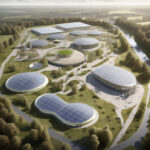In the annals of human history, the early beginnings of inventions mark a pivotal chapter that laid the groundwork for civilization as it is known today. From the rudimentary tools crafted by prehistoric humans to the complex mechanisms of ancient societies, the journey of invention is a testament to human ingenuity and adaptability. The earliest inventions, such as the wheel and the lever, were not merely functional; they represented a profound shift in how humans interacted with their environment.
These innovations allowed for more efficient transportation and labor, ultimately leading to the establishment of trade routes and the growth of communities. As societies evolved, so did their inventions. The development of agriculture around 10,000 BCE was perhaps one of the most significant milestones in human history.
The invention of farming tools, such as plows and sickles, transformed nomadic lifestyles into settled agricultural practices. This shift enabled populations to grow and thrive, leading to the rise of cities and complex social structures. The early inventions were not just about survival; they were about enhancing quality of life and fostering connections among people.
As these early inventors experimented with materials and techniques, they laid the foundation for future generations to build upon, creating a legacy of innovation that would echo through time.
Key Takeaways
- The early beginnings of inventions laid the foundation for human innovation and progress.
- The Renaissance and the Age of Discovery sparked a wave of new inventions and advancements in various fields.
- The Industrial Revolution and the rise of modern inventions transformed society and accelerated technological progress.
- World Wars had a significant impact on inventions, leading to the development of new technologies and innovations.
- The digital revolution and technological advancements have revolutionized the way we live and work, shaping the modern world.
The Renaissance and the Age of Discovery
The Renaissance, spanning from the 14th to the 17th century, heralded a remarkable period of cultural rebirth and intellectual exploration in Europe. This era was characterized by a renewed interest in science, art, and philosophy, which spurred a wave of inventions that would change the course of history. Visionaries like Leonardo da Vinci and Galileo Galilei emerged during this time, pushing the boundaries of knowledge and creativity.
Da Vinci’s sketches of flying machines and intricate designs for various devices showcased an imaginative spirit that sought to understand and manipulate the natural world. The Age of Discovery further propelled this inventive spirit as explorers set sail to uncover new lands and trade routes. Innovations in navigation, such as the astrolabe and improved ship designs, enabled sailors to traverse vast oceans with greater accuracy.
The invention of the printing press by Johannes Gutenberg in the mid-15th century revolutionized communication, allowing for the widespread dissemination of knowledge and ideas. This technological advancement not only facilitated the spread of Renaissance thought but also laid the groundwork for the Scientific Revolution that would follow. The interplay between exploration and invention during this period fostered a culture of curiosity that would inspire countless future innovations.
The Industrial Revolution and the Rise of Modern Inventions

The Industrial Revolution, which began in the late 18th century, marked a seismic shift in human society, characterized by rapid industrialization and urbanization. This era saw an explosion of inventions that transformed economies and lifestyles across the globe. The steam engine, perfected by James Watt, became a symbol of this revolution, powering factories and locomotives alike.
The ability to harness steam energy not only revolutionized transportation but also increased production capabilities, leading to mass manufacturing and a surge in consumer goods. As factories sprang up in urban centers, new inventions emerged to meet the demands of an increasingly industrialized world. Innovations such as the spinning jenny and the power loom revolutionized textile production, while advancements in metallurgy paved the way for stronger materials used in construction and machinery.
The rise of modern inventions during this period was not without its challenges; it brought about significant social changes, including labor movements advocating for workers’ rights amid harsh working conditions. Nevertheless, the Industrial Revolution laid the foundation for contemporary society, demonstrating how inventions could reshape economies and influence daily life on an unprecedented scale.
The Impact of World Wars on Inventions
| World War | Impact on Inventions |
|---|---|
| World War I | Development of tanks, airplanes, and radio communication |
| World War II | Advancements in radar technology, jet engines, and nuclear power |
The two World Wars had a profound impact on technological advancements and inventions, as nations mobilized their resources for war efforts. The urgency of conflict spurred rapid innovation in various fields, from weaponry to medicine. During World War I, inventions such as tanks and airplanes transformed warfare strategies, while advancements in communication technology improved coordination on the battlefield.
The need for efficient logistics led to innovations in transportation and supply chain management that would have lasting effects beyond the war. World War II further accelerated this trend, with significant breakthroughs in technology driven by military necessity. Radar technology emerged as a crucial tool for detecting enemy aircraft, while advancements in cryptography played a vital role in securing communications.
The development of penicillin during this time revolutionized medicine, saving countless lives on both sides of the conflict. Additionally, the post-war period saw a surge in consumer technology as military innovations transitioned into civilian applications. The invention of the microwave oven and advancements in aviation are just a few examples of how wartime inventions reshaped everyday life in the decades that followed.
The Digital Revolution and Technological Advancements
The late 20th century ushered in the Digital Revolution, a transformative era marked by rapid advancements in computing and information technology. The invention of the personal computer democratized access to technology, allowing individuals to harness computing power for various purposes—from business to creative expression. Pioneers like Steve Jobs and Bill Gates played pivotal roles in shaping this landscape, introducing user-friendly interfaces that made technology accessible to the masses.
The rise of the internet further revolutionized communication and information sharing on a global scale. With the click of a button, individuals could connect with others across continents, access vast repositories of knowledge, and engage in online commerce. This digital transformation has not only changed how people interact but has also given rise to new industries and job opportunities.
Social media platforms emerged as powerful tools for connection and expression, reshaping societal norms and influencing cultural trends. As technology continues to evolve at an unprecedented pace, it is clear that the Digital Revolution has fundamentally altered human existence.
Sustainable Inventions and Environmental Awareness

In recent years, there has been a growing awareness of environmental issues and sustainability, prompting a wave of innovative inventions aimed at addressing these challenges. As climate change becomes an increasingly pressing concern, inventors are focusing on creating solutions that minimize environmental impact while promoting sustainable practices. Renewable energy technologies such as solar panels and wind turbines have gained traction as viable alternatives to fossil fuels, enabling communities to harness clean energy sources.
Moreover, innovations in materials science have led to the development of biodegradable plastics and sustainable packaging solutions that reduce waste in landfills and oceans. The rise of electric vehicles represents another significant advancement in sustainable transportation, offering an eco-friendly alternative to traditional gasoline-powered cars. As consumers become more environmentally conscious, businesses are also adapting by investing in sustainable practices and technologies.
This shift towards sustainability reflects a broader societal commitment to preserving the planet for future generations while fostering innovation that aligns with ecological values.
The Future of Inventions: Artificial Intelligence and Robotics
As humanity stands on the brink of a new era defined by artificial intelligence (AI) and robotics, the future of inventions promises to be both exciting and transformative. AI technologies are already reshaping industries by automating processes, enhancing decision-making capabilities, and improving efficiency across various sectors. From healthcare to finance, AI-driven innovations are revolutionizing how tasks are performed, enabling professionals to focus on more complex challenges while leaving routine tasks to machines.
Robotics is another field poised for significant advancements in the coming years.
In manufacturing settings, collaborative robots—often referred to as cobots—are enhancing productivity by working alongside human workers rather than replacing them.
As these technologies continue to evolve, ethical considerations surrounding AI and robotics will become paramount. Society must grapple with questions about job displacement, privacy concerns, and the implications of autonomous decision-making systems.
The Role of Inventions in Shaping Human History
Throughout history, inventions have played a crucial role in shaping human civilization and influencing societal progress. From early tools that facilitated survival to modern technologies that connect people across vast distances, each invention has contributed to humanity’s collective journey. They have not only addressed immediate needs but have also sparked revolutions in thought, culture, and industry.
Inventions serve as markers of human achievement; they reflect society’s aspirations and challenges at any given time.
The legacy of past inventions informs present decisions about technology’s role in society while guiding future inventors toward solutions that prioritize sustainability and ethical considerations.
Ultimately, inventions are not merely products; they are integral threads woven into the fabric of human history—shaping lives, cultures, and destinies across generations.
For those interested in the evolution of industries and how historical inventions have paved the way for modern market dynamics, a related article worth reading discusses how global brands are tapping into India’s $130 billion wedding market. This article, available on Times of Innovation, explores the significant influence of cultural traditions on contemporary business strategies and highlights the innovative approaches companies are adopting to cater to this lucrative sector. You can read more about this fascinating intersection of tradition and commerce by visiting












